Interview
RS interviews producer and director
Kawser Mahmud about his upcoming movie
SHOBDOSHENA
By Dibbo
A movie about those who fought in the liberation war, off the battlefield,
not using guns, but using their voices as weapons instead. He talked to us about the movie, along with what he has to say to the youth of Bangladesh.
 RS: So, tell us about your new movie.
RS: So, tell us about your new movie.
KM: “The movie name has changed from “Ekattorer Shobdoshena” to “Shobdoshena”, meaning “voice warrior”. Initially it was a documentation, but now it's more like a docu-fiction. I started work as a director/producer in 2005, when all the key people (the voice warriors) lived abroad. I can mention two names: Belal Mohammad, founder of the Shadhin Bangla Betar Kendro, another is Abdullah Al-Farooq. We just organized a premier in 2009, receiving good response from different people. I talked to media critics so I got many suggestions. As a director, I have to project the right feel, because this is not fiction or a music video. This is a historical thing.
I talked to the crew and decided to re-do the documentary, with proper visuals. I dramatized in between interviews. Belal bhai said something and I showed it, sort of like acting out the stories while they're narrating it, and now it looks fictionized. It's still on the editing table and I'm pretty confident that it'll be released next month, before 26th March.
The great challenge to make this documentary was I didn't have any sponsor. My organization “Karuj Communications” is the producer because I didn't find any sponsors anywhere because it's very tough to support us continuously and I did not think it was wise to approach anybody saying “Please give me funds for this documentary” because even then I hadn't figured out when my work would end. That's the great problem I faced, and why it took time to complete this project.
RS: So, tell us exactly who a “Shobdoshena” is.
KM: Shobdoshena is actually a “voice warrior” because in '71, some radio workers got the courage and thought they wanted to do something and become freedom fighters. They they tried to say something and wanted to inspire people. They wanted to spread the hope, the courage of the freedom fighters. But it wouldn't be easy. “We had to do it, because yes initially we felt shy, we felt scared but when we worked together, when we started the radio station on 26th March, we felt inspired, and we tried to let everybody know what was going on and tried to spread hope and courage.”
Since I had worked in the media for a long time, I saw that the media had a huge influence and this Shadhin Bangla Betar Kendro became a huge part of our Liberation War. If you ask me what specialty there is in this documentary, I'd say it's the fact that no agenda from any political party has been used in it. The style of the film is that we didn't say anything ourselves, but made the Shobdoshena narrate it. All we did was act out what they narrated and put them together. There's a fight going on between the two parties about who declared independence. We didn't go into that. We're using only what we were told by the Shobdoshena. The timeline of the film started from 26th March and ended on 16th December. So we documented everything for 9 months after the 26th in great detail, and along with describing the Shadhin Bangla Betar Kendro and what they did, we also documented a lot of the history of the war.
We covered 64 people for our soundbytes. Major Ziaur Rahman was a shobdoshena too. Belal Mohammad and others thought they needed some security, and at that time, Ziaur Rahman was at Patiya after escaping from the Pakistani army in a warship loaded with weapons for freedom fighters. Belal Mohammad then approached him and asked him for help with starting their radio station. They wanted some protection and asked him to come to come to Kalurghat, which he did. Belal Mohammad then said “Sir, you are a Major, so will you please say something on the radio?”, and then he announced the independence. What I'm saying is, both political parties are trying to cash this in and take credit for it, and that shouldn't be happening, and it's something I made clear throughout my entire documentary. Even the Shobdo-shoiniks themselves said that this should not happen. The declaration of independence was unanimously called for by the entire country, not by any political party. The Shadhin Bangla Betar Kendro was bombed on the 29th of March. But the workers secretly hid the transmitters in a madrasah and in Bagafa camp in the Indo-Bangladesh border at Tripura and Noakhali, and then later, with the help of the BSF, they moved their equipment to a garage in Kolkata and worked from there. The places were the Shadhin Bangla Betar Kendro transmitted from in chronological order are their original station in Kalurghat, then the Madrasah, then Bagafa camp and then Kolkata. What we tried to do was narrate all four episodes of their work.
RS: What do you think of the whole situation at Shahbag?
KM: Here's something I want to say to the youth: Dear friends, who have set afloat the ships of hope in the sea of people at Shahbag, stay strong and courageous, but beware, make sure nobody convinces you to sell off your fragile minds and your initiative, because what's scarier than the Rajakar are those wearing masks around you. You might not recognize them. Not being able to tell face and mask apart is the reason Kader Molla shows us the victory sign. Now it's your turn. It's been 42 years and nobody had kept a single promise.
I fully support the spirit of the people at Shahbag, but not for those who are trying to cash in on it. The youth who are gathered at Shahbag with such a spirit, organized this movement online. Adults always tell us how we are wasting our life just going through facebook all day but this shows the power of online media, and what most of us are doing is actual work. The aim of wasting all the money I made in the last 8 years is that I want to let the next generations know about what really happened, to help them learn the truth. The youth are expressing the power of their voices at Shahbag, and that's what I also want to show in this documentary, the power of their voices. The youth will be the ones leading the new Bangladesh, getting rid of the old haggards running the country, and I hope what I envision comes true.
RS: Well, it was a pleasure talking to you, and we hope your movie becomes a success and what you're trying to achieve with it is successful as well.
MUSIC
KHIYO
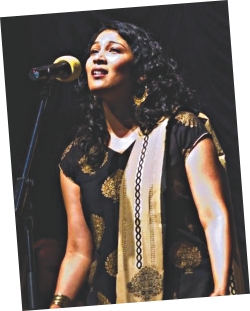 "Ma, tor mukher bani;
"Ma, tor mukher bani;
Amar kane lage;
Sudhar moto…
"
By Shaer Reaz
Photo: Shoayeeb Chamak
Few things bring out the inner patriot in a person as blatantly as a rousing rendition of his or her National Anthem. To most Bangalis, the lines “Amar Shonar Bangla…” are sacred, a testament to the sacrifice of hundreds of thousands of lives lost, their blood: the price we had to pay to sing these lines every morning in school, no matter how out of tune it may be.
So what happens when an artist exercises his or her right at creative remodelling on a country's national anthem? Apparently, people get offended and a huge uproar about it results.
Khiyo is a London-based British-Bengali band that creates a fusion of Bengali heritage music and western acoustic sounds, with the band members having backgrounds in western classical, rock, jazz, blues, NazrulSangeet, Bengali folk and Indian classical.
A certain news site approached a few members of the cultural elite of Dhaka and asked them for their opinions on the band Khiyo's cover of our national anthem, then took the quotes and blew the entire thing out of proportion, going so far as to label everyone involved in the cover, a “traitor” to Bangladesh.
SohiniAlam, the lead for the band Khiyo, had this to say about the comments on her band's work: “This issue is not about one band or one song…you have stood up for an artist's right to create, which results in a very different future from one that is forcefully imposed. I do not know who said what, as I was not present. What I do know is that I think Khairul Anam Shakil is probably Bangladesh's best male Nazrul-Shongeet singer. I also like Mita Haque's music, and like the aforementioned individuals, Sadi Mohammad and Mac Haque are entitled to their opinions. People are allowed to dislike our work (preferably without allegedly calling me a traitor to my country of origin). The one thing that no one can do is accurately guess Khiyo's motivations. Unless you live inside our heads, you cannot possibly know why we did what we did.”
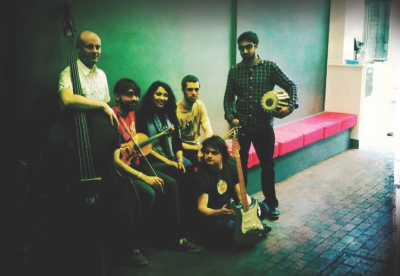 We approached Shakib Chowdhury, vocalist and guitarist for the band Cryptic Fate, and he gave us our thoughts on the whole matter: “I think the laws regarding the national anthem dictates to official functions and state functions. This song was a Rabindra-Sangeet way before it was selected as a national anthem. So if anyone wants to do their own rendition of this song out of love, I am all for it. Khiyo's version is the best version I have heard.”
We approached Shakib Chowdhury, vocalist and guitarist for the band Cryptic Fate, and he gave us our thoughts on the whole matter: “I think the laws regarding the national anthem dictates to official functions and state functions. This song was a Rabindra-Sangeet way before it was selected as a national anthem. So if anyone wants to do their own rendition of this song out of love, I am all for it. Khiyo's version is the best version I have heard.”
There lies the problem: people assume our National Anthem cannot be changed or altered in any way, but, technically, “Amar Shonar Bangla” is a Rabindra-Sangeetfirst and foremost, and since Tagore songs are free from copyright laws, anyone has the right to present this genre of songs in their own way. Elita Karim, popular singer and journalist, said she liked the song and appreciated the introduction of new instruments and the creative restructuring, but based on her knowledge, Khiyo did nothing wrong in covering “Amar Shonar Bangla”. She did, however, question the basis on which Sohini and her band were called traitors, as she believes enough reasoning must be given before someone is labelled a traitor.
Whether you like it or not, we need to give artists some leeway in what is perceived to be permitted, for the sake of artistic expression.Sohini and the rest of Khiyo (Oliver Weeks- acoustic & electric guitars, piano; Ben Hillyard- upright & electric bass; Derek Scurll - drums; Hassan Mohyeddin –tabla; DanyalDhondy - viola/violin; SoumikDatta - guest sarod) have made their peace with everyone involved, and has moved past the whole matter, and are continuing on their work.
Head to their page www.khiyo.com to listen to their covers of “Amar Shonar Bangla” and “Purbo Digontey”, they come highly recommended.
GAME REVIEW
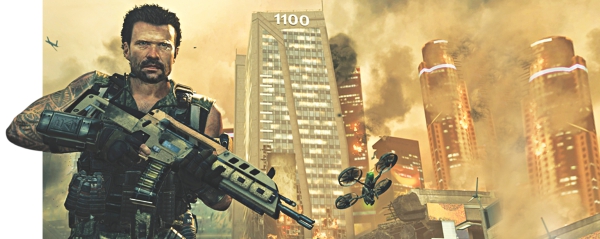
CALL OF DUTY BLACK OPS 2
By Shaer Reaz
RATINGS:
GAMEPLAY: 8.5/10;
GRAPHICS: 8/10;
STORY: 7/10
So, yet another Call of Duty game. If anyone is getting tired of them, I see no reason yet, since Treyarch somehow finds a way to keep the throngs of CoD fans hooked on the same basic formula, year after year. Does Black Ops 2 deliver?
To be honest, this review is a bit late because I thought it wouldn't be worth getting. I couldn't have been more wrong. Black Ops 2, in all its explosive glory, delivers on every level, with the slight lacking in plotlines that we have come to expect from first person shooters and more specifically, Call of Duty games.
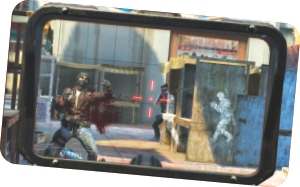 Black Ops 2 alternates between the roles of Alex Mason during the 1980s and that of his son, David, in 2025. David Mason and his partner, Harper, are talking to a geriatric Sargent Frank Woods in 2025, as he recalls the final missions he and Alex Mason went on, before the death of Alex Mason. David and Harper's goal is to gather intel on Raul Menendez, a Nicaraguan ex-drug lord turned “saviour angel of the masses”, and the leader of the terrorist organization Cordis Die. Through Frank's flashbacks, you take charge of Alex Mason and witness the events that led to the rise to power of Menendez, and fast-forwarding to 2025, you take charge of David Mason and attempt to stop Menendez from bringing the entire world into chaos.
Black Ops 2 alternates between the roles of Alex Mason during the 1980s and that of his son, David, in 2025. David Mason and his partner, Harper, are talking to a geriatric Sargent Frank Woods in 2025, as he recalls the final missions he and Alex Mason went on, before the death of Alex Mason. David and Harper's goal is to gather intel on Raul Menendez, a Nicaraguan ex-drug lord turned “saviour angel of the masses”, and the leader of the terrorist organization Cordis Die. Through Frank's flashbacks, you take charge of Alex Mason and witness the events that led to the rise to power of Menendez, and fast-forwarding to 2025, you take charge of David Mason and attempt to stop Menendez from bringing the entire world into chaos.
If that plot looks a bit cumbersome to you, other than the nagging feeling that the story doesn't gel really smoothly, you don't seem to notice it much when you're blowing things up and shooting bad guys in the head. While the first Black Ops game had a terrific story (in my opinion), with a lot of intriguing twists, the new one tries hard but falls short of the golden mark. Like I said though, you don't notice the shortcomings in the story till you really sit down and analyse it.
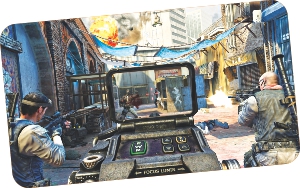 The gameplay gets minor changes here and there that suitably updates it to 2025 specs, with the weapons and gadgets being the grunt of the refreshments. You also get a completely new game mode, called Strike Force. Strike Force is all about close control of a limited number of soldiers, turrets, and armoured unmanned tank-like thingies called CLAWs. You can hand out orders, then take control of any one unit and lead from the ground. It takes a little getting used to, but once you have the basic controls in your head, getting to your goal (usually defend this, destroy that, etc.) is actually pretty easy. Strike Force missions also boosts the re-run plays of the game, as you can try new tactics every time you attempt a mission.
The gameplay gets minor changes here and there that suitably updates it to 2025 specs, with the weapons and gadgets being the grunt of the refreshments. You also get a completely new game mode, called Strike Force. Strike Force is all about close control of a limited number of soldiers, turrets, and armoured unmanned tank-like thingies called CLAWs. You can hand out orders, then take control of any one unit and lead from the ground. It takes a little getting used to, but once you have the basic controls in your head, getting to your goal (usually defend this, destroy that, etc.) is actually pretty easy. Strike Force missions also boosts the re-run plays of the game, as you can try new tactics every time you attempt a mission.
Graphics is as usual, very good. Explosions, bullet holes, buildings collapsing and cars being blown up, all of it looks pretty darn good. The musical score is simple and constantly on repeat, but it sets a nice setting for the events in the game, so job well done in that department.
Multiplayer is a strong suit for any Call of Duty game, so if you own a console, you'll definitely want to check out the multiplayer or co-op sections of the game, including Zombie Mode. PC users don't have much options when they want to play multiplayer, so let's leave it at that.
Overall, Call of Duty: Black Ops 2 is a great game that you should definitely check out (if you haven't already), for its great gameplay, good visuals and mildly interesting storyline.
